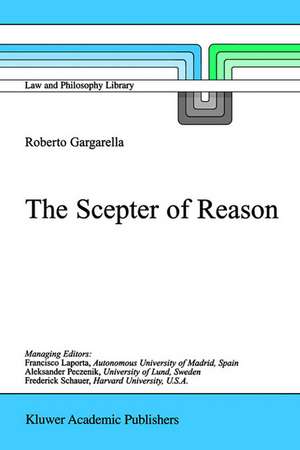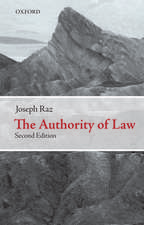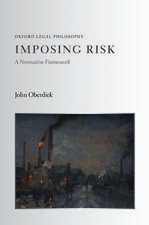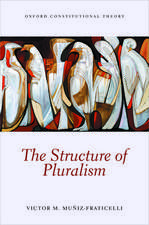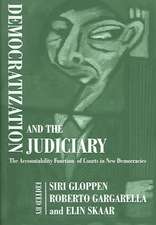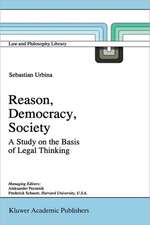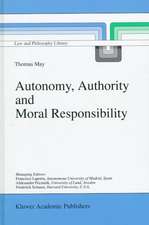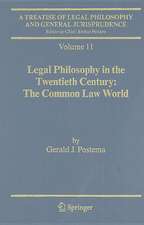The Scepter of Reason: Public Discussion and Political Radicalism in the Origins of Constitutionalism: Law and Philosophy Library, cartea 48
Autor R. Gargarellaen Limba Engleză Paperback – 30 noi 2001
| Toate formatele și edițiile | Preț | Express |
|---|---|---|
| Paperback (1) | 381.00 lei 6-8 săpt. | |
| SPRINGER NETHERLANDS – 30 noi 2001 | 381.00 lei 6-8 săpt. | |
| Hardback (1) | 388.13 lei 6-8 săpt. | |
| SPRINGER NETHERLANDS – 30 sep 2000 | 388.13 lei 6-8 săpt. |
Din seria Law and Philosophy Library
- 20%
 Preț: 813.11 lei
Preț: 813.11 lei - 20%
 Preț: 569.00 lei
Preț: 569.00 lei - 18%
 Preț: 1225.16 lei
Preț: 1225.16 lei - 18%
 Preț: 950.66 lei
Preț: 950.66 lei - 15%
 Preț: 583.43 lei
Preț: 583.43 lei - 15%
 Preț: 639.25 lei
Preț: 639.25 lei - 15%
 Preț: 641.53 lei
Preț: 641.53 lei - 18%
 Preț: 893.84 lei
Preț: 893.84 lei - 24%
 Preț: 797.39 lei
Preț: 797.39 lei - 15%
 Preț: 579.84 lei
Preț: 579.84 lei - 15%
 Preț: 644.95 lei
Preț: 644.95 lei - 18%
 Preț: 895.76 lei
Preț: 895.76 lei - 15%
 Preț: 644.95 lei
Preț: 644.95 lei - 20%
 Preț: 571.85 lei
Preț: 571.85 lei - 15%
 Preț: 642.03 lei
Preț: 642.03 lei - 18%
 Preț: 1232.26 lei
Preț: 1232.26 lei - 18%
 Preț: 1116.05 lei
Preț: 1116.05 lei - 15%
 Preț: 655.92 lei
Preț: 655.92 lei - 18%
 Preț: 833.54 lei
Preț: 833.54 lei - 18%
 Preț: 898.26 lei
Preț: 898.26 lei - 18%
 Preț: 1016.63 lei
Preț: 1016.63 lei -
 Preț: 390.25 lei
Preț: 390.25 lei - 24%
 Preț: 700.89 lei
Preț: 700.89 lei - 18%
 Preț: 999.60 lei
Preț: 999.60 lei - 18%
 Preț: 1115.77 lei
Preț: 1115.77 lei - 18%
 Preț: 1107.88 lei
Preț: 1107.88 lei - 15%
 Preț: 637.46 lei
Preț: 637.46 lei - 18%
 Preț: 781.94 lei
Preț: 781.94 lei - 24%
 Preț: 815.54 lei
Preț: 815.54 lei - 18%
 Preț: 786.18 lei
Preț: 786.18 lei - 18%
 Preț: 735.21 lei
Preț: 735.21 lei - 15%
 Preț: 653.33 lei
Preț: 653.33 lei - 18%
 Preț: 782.10 lei
Preț: 782.10 lei
Preț: 381.00 lei
Nou
Puncte Express: 572
Preț estimativ în valută:
72.91€ • 75.84$ • 60.19£
72.91€ • 75.84$ • 60.19£
Carte tipărită la comandă
Livrare economică 15-29 aprilie
Preluare comenzi: 021 569.72.76
Specificații
ISBN-13: 9781402002861
ISBN-10: 1402002866
Pagini: 172
Ilustrații: XXVIII, 143 p.
Dimensiuni: 155 x 235 x 9 mm
Greutate: 0.25 kg
Ediția:Softcover reprint of the original 1st ed. 2000
Editura: SPRINGER NETHERLANDS
Colecția Springer
Seria Law and Philosophy Library
Locul publicării:Dordrecht, Netherlands
ISBN-10: 1402002866
Pagini: 172
Ilustrații: XXVIII, 143 p.
Dimensiuni: 155 x 235 x 9 mm
Greutate: 0.25 kg
Ediția:Softcover reprint of the original 1st ed. 2000
Editura: SPRINGER NETHERLANDS
Colecția Springer
Seria Law and Philosophy Library
Locul publicării:Dordrecht, Netherlands
Public țintă
ResearchCuprins
1 Radicalism and Conservatism in England.- The Authority of the People Outside the Parliament.- The Crisis of Political Representation.- The “Radical Societies” in England.- The Radicals’ Epistemic View, and their Egalitarianism.- The Radicals’ Institutional Proposals.- The Conservative Challenge.- When Thomas Paine Confronted Edmund Burke.- 2 Radicalism and Populism in the U.S..- A Government for the Majority.- Town Meetings and County Conventions 29 The Constitution of Pennsylvania: The Experiment of “Unchecked Majorities”.- The Constitution of Pennsylvania in Motion.- The “Critical Period” of American History.- The Context of the Crisis.- The Demand for Paper Money and Counter-Institutional Reactions.- Institutional Responses to the Majority Claims.- The Paper-Money Crisis in Rhode Island.- The Critics of Radicalism/Populism.- 3 The Conservative Reaction. James Madison: Institutional Reforms Against The Power of Factions.- The Evolution of Madison’s Ideas of Factions. Earlier Approaches.- Defining the “Vices of the Political System”.- Analyzing the Madisonian Definition of Factions.- Representation.- Minorities.- Checks and Balances.- The Problems of the System of Checks and Balances.- 4 The Conservative Reaction II. Defending the New Institutions in the Federal Convention.- The “Conservative” Antifederalists.- The Federalists.- The North American Constitution and Epistemic Elitism.- About Popular Assemblies and the House of Representatives.- Some Basic Tools.- The Executive.- The Senate.- The Judiciary.- 5 The Conservative Model of Deliberation.- Why Deliberation? What Kind of Deliberation?.- The Elitist Character of the Conservative Model of Deliberation.- Why Restricted Deliberation?.- Radicalism and Public Deliberation.- Why PublicDeliberation?.- Appendix Contemporary Political Institutions and Deliberation.- The Possibility of Deliberation.- The Judiciary and Public Dialogue.- The Political Branches of Government and Deliberation.- We the People and Interbranch Dialogue.- Final Notes.
